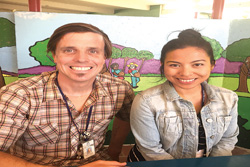“Kindness is the language which the deaf can hear and the blind can see.” – Mark Twain
It is easy to believe that kindness is a sign of passivity or weakness. This is especially true when we are being hard on ourselves for not being strong enough; those moments when we feel like we have to prove our worth to the people around us. The truth, however, is that the most successful people in the world are those who understand the value of kindness.
Real kindness comes from a sincere appreciation for life, and the ability to recognize the beauty and the gifts in others. Kindness is born out of confidence in the goodness within everything and everybody. It is impossible to enjoy any measure of success without practicing kindness.
Kindness connects us with the people around us and creates an atmosphere of mutual success and mutual celebration. Kindness also shines light into the moments of darkness that we all face, without getting sucked into the belief that the whole world is dark. It is the ability to choose a productive outlook, regardless of outer circumstances, or how the people we encounter might be feeling or acting.
The tricky part is having faith in kindness when we are feeling threatened. For example, when we make a call to our cell phone provider, visit the auto mechanic, or while standing in a long line at Starbucks. Rather than attacking, or running away, we can learn to recognize these moments as opportunities to practice kindness.
The key to practicing kindness, especially when we are threatened, is to start with ourselves. We must first talk kindly to the parts of our own mind that are scared or worried. Only when we find some level of peace on the inside are we then able to extend sincere kindness to others. When we first practice on our own mind, it lends power and validity to the kindness we extend to others.
When our students are experiencing challenges, it is important to remind them to be kind. Once again, the first place to apply kindness is to the places in them that are feeling threatened in some way. Perhaps they feel like they are not smart enough, or something embarrassing is happening at home. Our children need to be reminded to be their own best friends.
I run a lunch group of fourth and fifth graders that are frequently at odds with each other. Many of them have unique learning challenges and difficult home lives. Sitting with them, I can see how the lack of kindness that they sometimes show to one another is an indicator of how good they are feeling on the inside.
When I notice that there is more drama and upset than usual, I first drop into my own heart and practice kindness to the part of me that does not enjoy being around them. I send love to the places inside me that feel like my image as a teacher is threatened by their behavior. Once I find that place of calm, I begin talking to these students individually, then as a whole group.
Looking into their young eyes and letting them know that they are okay, is the first step. Seeing past their defense mechanisms and recognizing them as intelligent children, who simply feel like they are in over their head, creates a bridge between us. It also softens the barriers that they have formed between one another, and starts to get them into a more cooperative state of being with one another. It does not take a long time before the genuine laughter and smiles return to their faces.
If you are having difficulty at home, at work, or in one particular relationship, extend some kindness to yourself. Whatever part of you is feeling threatened needs some love. Once you feel that part of you relax, reflect on ways that you can extend sincere kindness to the people around you.
Edward Biagiotti is the Inclusion Specialist for Culver City Unified School District. He is also co-host of the popular radio show, Funniest Thing! with Darrell and Ed, to find out more go to www.DarrellandEd.com. Visit www.TappingIntoGenius.com for more articles and a free, inspirational parenting download.















